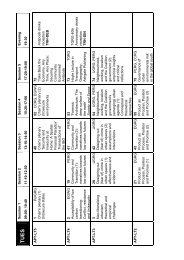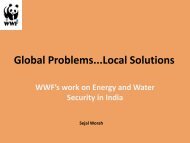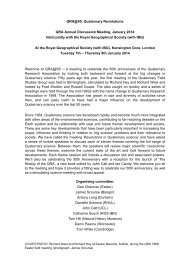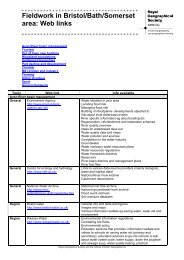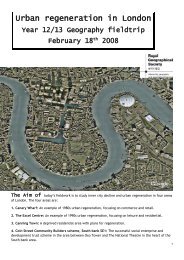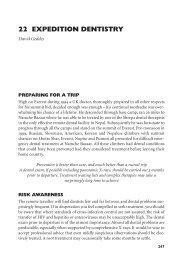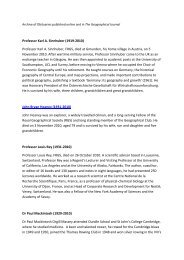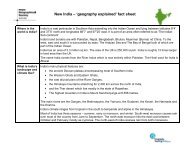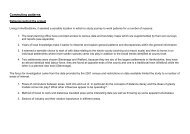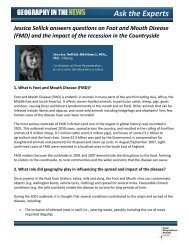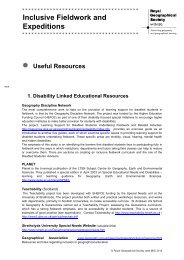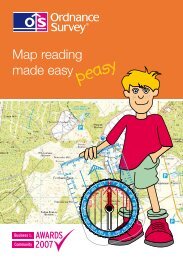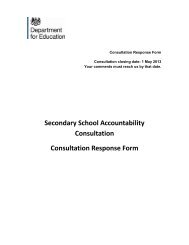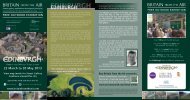ILCB programme summary PDF - Royal Geographical Society
ILCB programme summary PDF - Royal Geographical Society
ILCB programme summary PDF - Royal Geographical Society
You also want an ePaper? Increase the reach of your titles
YUMPU automatically turns print PDFs into web optimized ePapers that Google loves.
Shell funded project<br />
International leadership and<br />
capacity building for young people<br />
in field research<br />
This three year <strong>programme</strong>, launched in 2007, is supported by <strong>Royal</strong> Dutch Shell. It<br />
provides support in the following areas:<br />
• building capacity and leadership skills for field researchers at an early stage in their careers in some of the<br />
world’s poorer countries, particularly Ecuador, Indonesia and Uganda<br />
• developing long-term partnerships with selected NGOs, universities and others, to help capacity building and<br />
deliver in-country training and support.<br />
• establishing and sustaining networks of former researchers to mentor and provide exemplars and role models<br />
for the individuals involved in field research.<br />
• encouraging the development of leadership roles in field research for Ecuadorian, Indonesian and Ugandan<br />
researchers.<br />
The <strong>programme</strong> focuses on Ecuadorian, Indonesian and Ugandan individuals at an early<br />
stage in their careers in field research and who hold an undergraduate degree in<br />
geography or a relevant field science. Their field research work should make a contribution<br />
to the Millennium Development Goals relating to "ensuring environmental sustainability"<br />
particularly in the areas of:<br />
• sustainable development<br />
• reversing the loss of environmental resources and biodiversity<br />
• access to safe water<br />
This project provides a more equitable international involvement of individuals in their own<br />
field research projects and their own skills and capacities.<br />
This will be achieved through the funding of field research bursaries, provision of online<br />
support and mentoring and in-country capacity building.<br />
This work is a natural development of the <strong>Society</strong>’s Geography Outdoors’ activities,<br />
strengthening its international reach and the equitable involvement of participants from<br />
outside the UK and particularly in Ecuador, Indonesia and Uganda.
Activities:<br />
The activities under this <strong>programme</strong> fall into four groups.<br />
A. Making the most of past experience: support network and encouragement.<br />
The project will:<br />
* Document our international network of experienced field researchers and institutions,<br />
drawing on our years of supporting young people in field research, techniques training<br />
and health and safety. This will form a basis of an international support network.<br />
* Extend our international network by identifying new partnerships with NGOs and<br />
universities based in developing countries, as required for this <strong>programme</strong>.<br />
* Identify at least 20 good examples of past and current field research projects that<br />
contribute to the Millennium Development Goals relating to environmental sustainability.<br />
These examples, highlighting their impact on communities and countries, will be<br />
documented and shared internationally online as a way of demonstrating how young<br />
people in particular can contribute.<br />
* Identify a network of individual young people from among past participants in the<br />
international projects, who have benefited from their involvement in field activities. We<br />
will enable them to share the benefits they have gained (online) as role models, to<br />
encourage others to participate.<br />
B. Guidance and support for young people planning international field projects.<br />
The project will:<br />
* Create an online bank of resources, advice and training that promote good practice in the<br />
following 5 areas: leadership and project planning; field research techniques; health and<br />
safety; building and sustaining international and intercultural partnerships; and exemplar<br />
ideas of field research relevant to Millennium Goals.<br />
* Build sustainable partnerships with identified NGOs and universities to support them in<br />
selecting, and training where necessary, the young people from the partner developing<br />
countries who wish to participate in international projects. The aim is to build capacity for<br />
a locally-based and sustainable source of advice and support for local young people.<br />
* Provide mentoring, by both local and international mentors drawn from our network, of<br />
the young leaders and involve them in an international network of participants.<br />
* Provide specific guidance, for all individuals involved, in international team work and<br />
equitable partnerships.<br />
C. Delivering the independent field projects.<br />
The project will:<br />
* Offer guidance with local partners and mentors, during the project planning phase.<br />
* Encourage applications to the <strong>Society</strong>’s existing relevant grants schemes for such<br />
projects and provide additional financial support to cover field expenses for the<br />
participants from the poorer countries. We anticipate a minimum of 15 projects across<br />
the three countries to be supported over the three year timescale; it may well be more.<br />
* Undertake reflective evaluation with all the young people involved in the projects<br />
throughout the training, delivery and mentoring phases – the outcomes of which will be<br />
posted sensitively online.
* Profile the young leaders supported through this <strong>programme</strong> at relevant international fora<br />
and in appropriate publications.<br />
D. Project evaluation:<br />
* Evaluate the <strong>programme</strong> with specific focus on the impact on individual young field<br />
researchers and the contribution of the <strong>programme</strong> to relevant Millennium Goals.<br />
* Evaluate our development of a new and more inclusive model of supporting field-based<br />
learning, with particular reference to its future sustainability and replication in other<br />
contexts and other countries.<br />
* Make the results of this <strong>programme</strong> available internationally, for others to learn from and<br />
as encouragement for others.<br />
Impacts:<br />
This <strong>programme</strong> hopes to provide demonstrable benefits in a number of ways. These<br />
include:<br />
• The development of field research, leadership and cultural understanding skills among<br />
an international network of students and recent graduates at the start of their careers –<br />
especially those in the world’s poorer countries.<br />
• Field projects that raise awareness of, and make a contribution to, achieving the<br />
Millennium Development Goals relating to environmental sustainability in some of the<br />
world’s poorer countries.<br />
• A greater understanding of the need to achieve more sustainable approaches to<br />
natural resource management and a shared commitment to positive outcomes.<br />
• A greater appreciation of the importance of environmental research and the tangible<br />
benefits of cross-cultural partnership between young people.<br />
• The creation and piloting of a new sustainable model for supporting field activities and<br />
research which, we hope, will be transferable more widely internationally.<br />
For more information about the Shell International Leadership and Capacity Building<br />
<strong>programme</strong> please contact:<br />
Shane Winser<br />
s.winser@rgs.org<br />
Geography Outdoors:<br />
the centre supporting field research, exploration and outdoor learning<br />
<strong>Royal</strong> <strong>Geographical</strong> <strong>Society</strong> with IBG<br />
1 Kensington Gore<br />
London SW7 2AR



